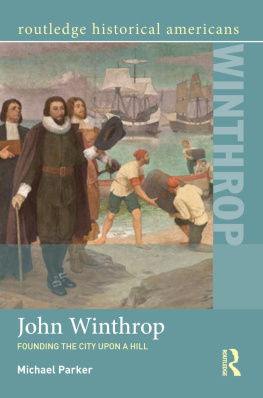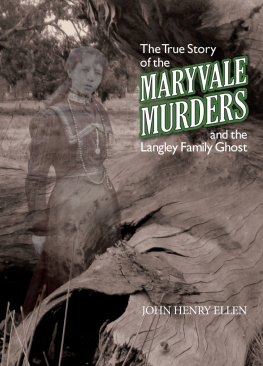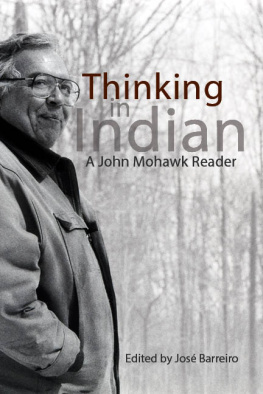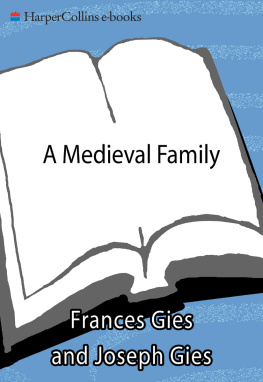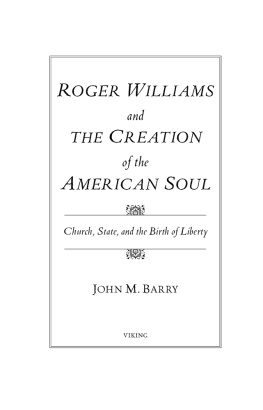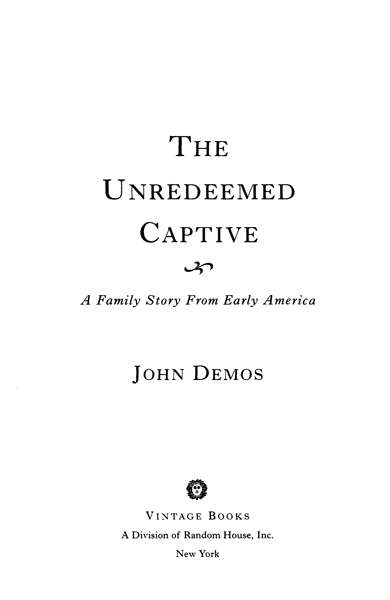Acclaim for
J OHN D EMOSS
T HE U NREDEEMED C APTIVE

John Demoss distinguished book has the gripping fascination of a good detective story and the imaginative reach of a first-class novel. The Unredeemed Captive adds not only to our knowledge of colonial history but to our understanding of the possibilities of history itself.
from the Nomination for the National Book Award
The real triumph lies not only in Demoss ability to lead us from the microcosm of a family to the macrocosm of a regional culture, but in the sympathy he creates. It is the triumph of a vigorous narrative voice.
Washington Post Book World
In John Demoss hands [Eunice Williamss] story is powerful, resonant and moving. Demos has done the risky, the necessary thing. He has embraced imagination and yieldedin a controlled and chary wayto its delights. Her story, told in spare and disciplined prose, goes straight to the heart of the puzzle of personal identity. An exercise in scrupulous scholarship and imaginative sympathy.
London Review of Books
A narrative brought to life by imagination and a glistening style brilliantly imagined. Demos understands Puritan New England and has the master scholars ability to stand back and see with a fresh eye. An intimate, stylish book.
Milwaukee Journal
A lively introduction to an authentically multicultural North America.
The New York Times Book Review
Fascinating combines the historians attention to evidence with the storytellers sense of a good tale. [This is] a book that is both a triumph of original research and a feast of stylistic innovation.
Seattle Times
A masterpiece. The historians craft at its best recovering for us the poignant story of lives and families shattered and then painfully knitted together again in the complex cultural encounters between English, French, and Mohawk peoples in 18th-century America. There is nothing quite like it in our literature. A stunning achievement that should change forever how we write and tell stories about the American past.
William Cronon
John Demos can do something no one else can do as well: bring to empathetic life the distant world of the New England Puritans. He has surpassed himself, managing to revivify both the Puritans and some of the Native Americans they dispossessed. Demos manages to winkle out a world of complexitiesand manages to do it all in dazzling narrative style.
American Heritage
Fresh, rich andmost importantthoroughly, delightfully readable. As well as a family story, the book is a fascinating portrait of French, English, and Indian cultures in the later Puritan period.
Boston Globe, Critics Choice for Best Nonfiction
The best history book this year was John Demoss The Unredeemed Captive, a beautifully written story of crossing boundaries.
The Independent on Sunday
J OHN D EMOS
T HE U NREDEEMED C APTIVE

J OHN D EMOS was born and raised in Cambridge, Massachusetts, graduated from Harvard College, and received his professional training at Oxford, the University of California at Berkeley, and Harvard. He has taught at Brandeis University and at Yale, where he is currently Samuel Knight Professor of American History. His previous books included Little Commonwealth: Family Life in Plymouth Colony, Entertaining Satan: Witchcraft and the Culture of Early New England (for which he received the 1983 Bancroft Prize), and Past, Present, and Personal: The Family and the Life Course in American History.
Also by J OHN D EMOS
A Little Commonwealth:
Family Life in Plymouth Colony
Entertaining Satan:
Witchcraft and the Culture of Early New England
Past, Present, and Personal:
The Family and the Life Course in American History
FIRST VINTAGE BOOKS EDITION, APRIL 1995
Copyright 1994 by John Demos
Maps copyright 1994 by David Lindroth
All rights reserved under International and Pan-American Copyright Conventions.
Published in the United States by Vintage Books, a division of Random House, Inc., New York, and simultaneously in Canada by Random House of Canada Limited, Toronto. Originally published in hardcover by Alfred A. Knopf, Inc., New York, in 1994.
A portion of this work was originally published in American Heritage.
Grateful acknowledgment is made to Noelle Oxenhandler for permission to reprint an epigraph from Pollys Face by Noell Oxenhandler, originally published in The New Yorker, November 29, 1993. Reprinted by permission of the author.
The Library of Congress has cataloged the Knopf edition as follows:
Demos, John.
The Unredeemed Captive: A Family Story from Early America by John Demos1st ed.
p. cm.
eISBN: 978-0-307-79069-9
1. Williams, Eunice, 1696-1786. 2. Williams family. 3. Williams John, 1664-1729. 4. Mohawk IndiansCaptivities. 5. United StatesHistoryQueen Annes War, 1702-1713. 6. Deerfield (Mass.)HistoryColonial period, ca. 1600-1775. 7. MassachusettsBiography. 1. Title.
E197.D46 1994
973-25dc20 93-23907
v3.1
To
Alison and Moira
with love
there is something about kidnapping that retains a unique horror. It is, of course, the ultimate horror for parents, for it accomplishes in a single hour a realization that under normal circumstances is the work of years and years: the realization that our children have a fate that is separate from our own.
N OELLE O XENHANDLER , Pollys Face,
The New Yorker (1993)
No human being, who has not experienced a similar misfortune, is capable of conceiving the horror which thrilled through my frame upon finding myself a captive to these ruthless barbarians. Bred up with an instinctive horror of Indians and Indian cruelties, it was a situation which, of all others, I had most deprecated.
Charles Johnston, returned captive (179091)

The moment that [the captive] enters the lodge to which he is given his bonds are untied. He is washed with warm water to efface the colors with which his face was painted and he is dressed properly. Then he receives visits of relatives and friends of the family into which he is entering. A short time afterwards a feast is made for all the village to give him the name of the person whom he is resurrecting and from that moment, he enters upon all his rights.
J. F. Lafitau, Jesuit missionary to the Kahnawake Mohawks (171217)

[Captivity is] an awfull School for Children When We See how Quick they will Fall in with the Indians ways. Nothing Seems to be more takeing. In Six months time they Forsake Father & mother, Forgit thir own Land, Refuess to Speak there own toungue & Seeminly be Holley Swollowed up with the Indians.
Titus King, returned captive (175558)
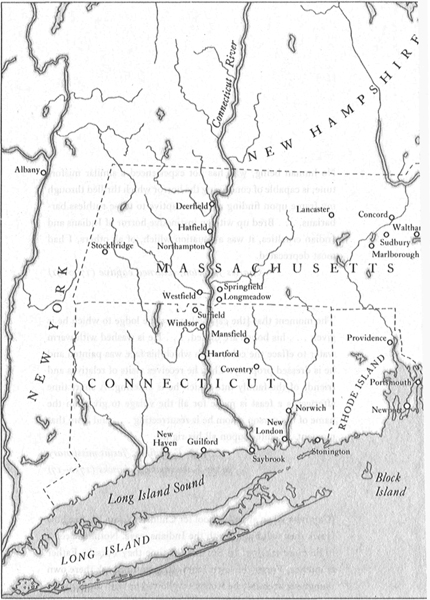
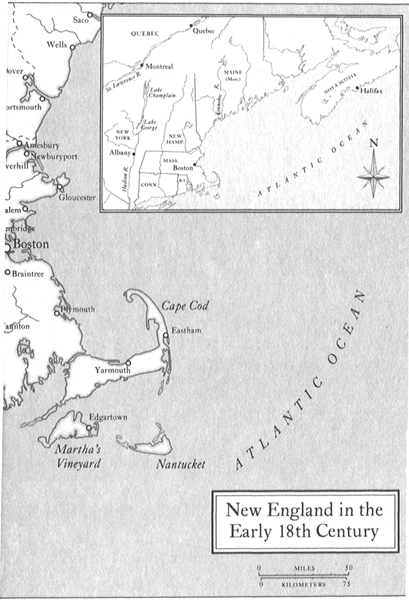
Next page


